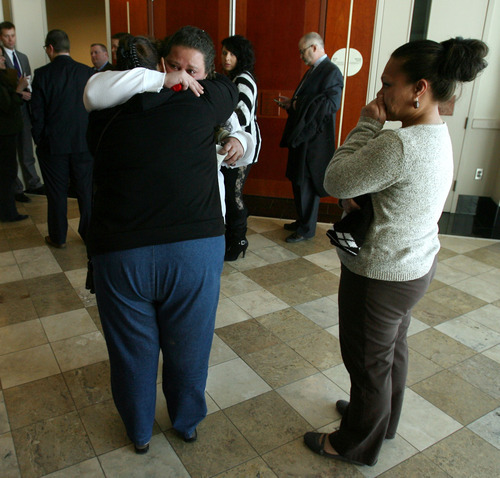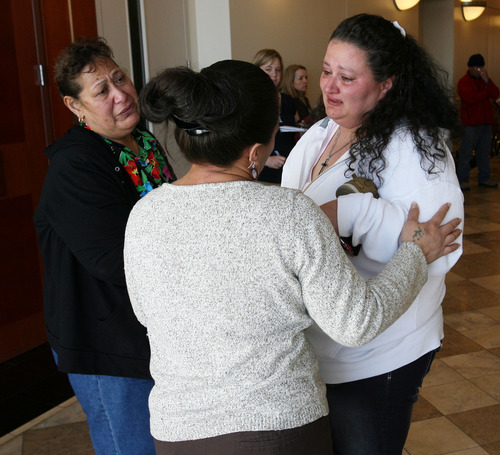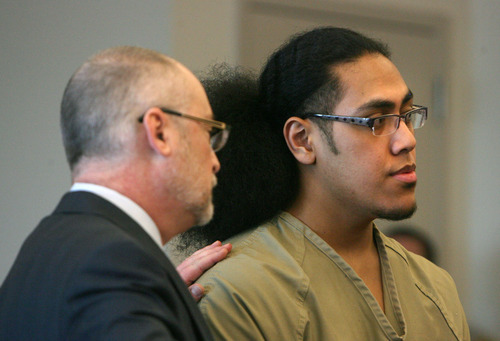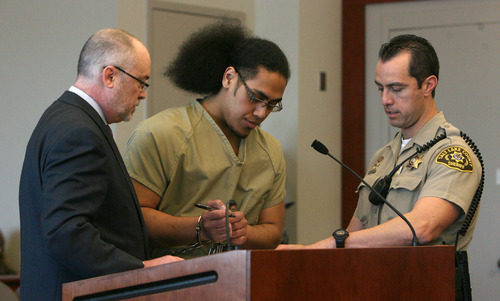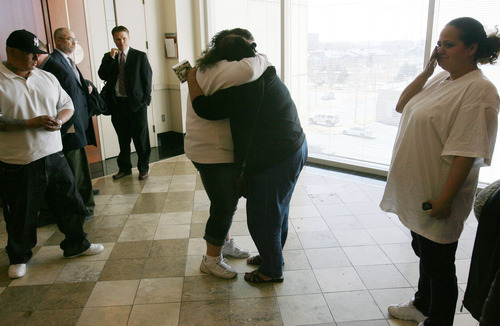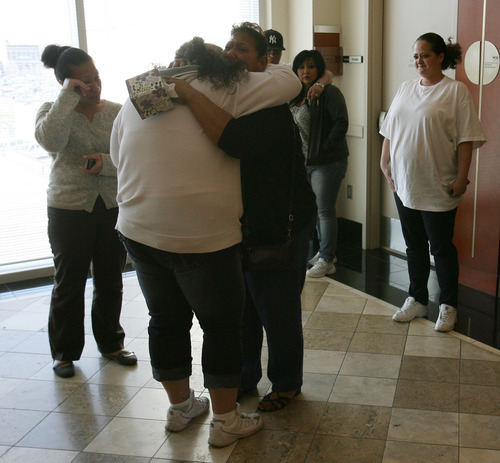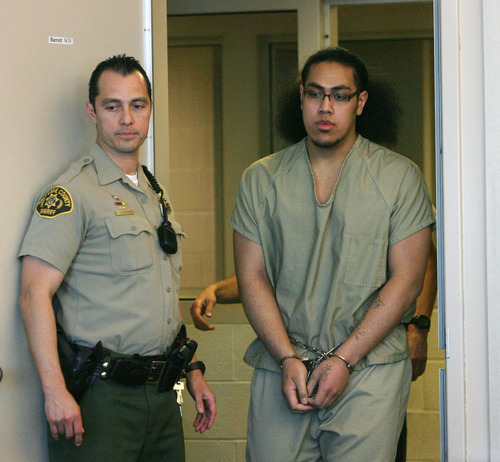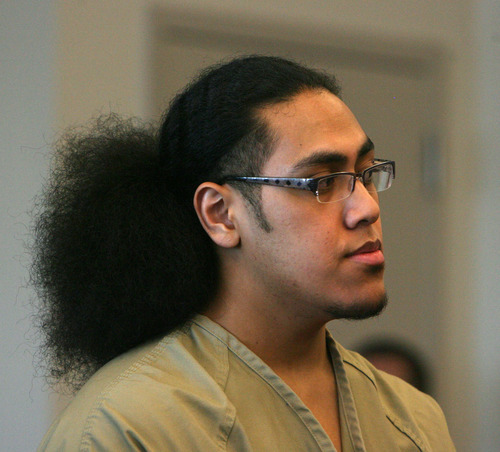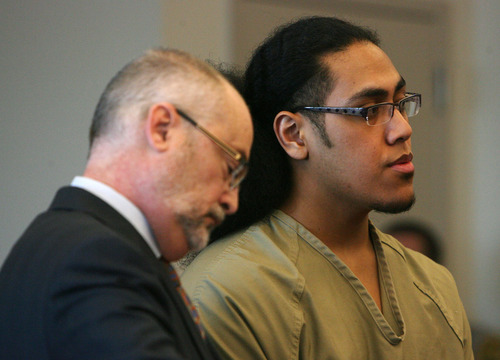This is an archived article that was published on sltrib.com in 2012, and information in the article may be outdated. It is provided only for personal research purposes and may not be reprinted.
Seneuefa Farani waited sobbing in a courthouse hallway on Thursday after her 17-year-old son pleaded guilty to murdering another teenager on a West Valley City golf course three years ago.
Farani had two words for Elka Fernandez, whose 18-year-old son JoJo Brandstatt was fatally shot by Farani's son, Hunter, when the boy was barely 14.
"I'm sorry," the shaking woman told Fernandez. "I'm so sorry."
The two embraced as Fernandez consoled the mother of her son's murderer.
"I forgive you," said Fernandez. "And I forgive Hunter."
The emotional encounter came after Hunter Farani pleaded guilty to aggravated murder and two counts of aggravated kidnapping before Judge William Barrett, bringing closer to an end a lengthy court journey that began in 2009.
Farani will face 20 years to life on the murder count and up to 10 years to life on each kidnapping charge when he is sentenced April 27 by Barrett. In exchange for Farani's plea to murder and kidnapping, prosecutors agreed not to seek life without parole, and they dismissed five aggravated robbery charges.
Farani's case has flipped between the juvenile and adult court systems. Most recently, an appeals court remanded Farani's case to the juvenile court system in December so a judge could reconsider his 2009 decision to certify the teen as an adult, following a ruling from the Utah Court of Appeals.
The appeals court said 3rd District Juvenile Court Judge Andrew Valdez had relied on a juvenile probation department report containing information considered inadmissible hearsay.
But a second decision by Valdez, issued Jan. 25, stated that even without considering the probation report, testimony offered at Farani's 2009 certification hearings warranted the case being moved from juvenile to district court.
Farani's attorneys had argued he belongs in juvenile court, where a maximum sentence for his crime would have resulted in juvenile detention until age 21.
Defense attorney Richard Van Wagoner reiterated on Thursday that his client's venue would have been different. He said there has been little question on whether Hunter Farani would plead to Brandstatt's murder, given the evidence in the case.
"It has been a question of where he would be adjudicated as opposed to whether he would accept responsibility," Van Wagoner said. "While he has a relatively large and tough exterior, he was barely 14. I wish we'd been able to keep it in juvenile court. But we didn't."
Brandstatt was kidnapped and killed the night of Feb. 6, 2009. Earlier that night, Farani and three older gang members also kidnapped another man, Gregory Brown, now 22.
Brown claims he was told by the group that if he was able to get $2,000 by the end of the night through robberies, they wouldn't kill him. Brown said he called Brandstatt, who agreed to meet the group with the address of a gang member they could rob.
When Brandstatt arrived, he was wearing a red T-shirt and red shoelaces, indicating a connection to Norteño gang members. Farani allegedly said, "Let's just finish off this Norte."
The group drove to a West Valley City golf course, where Farani allegedly shot and killed Brandstatt. Afterward, the group forced Brown to rob three convenience stores with a pellet gun.
Farani confessed to the crime during a videotaped interview with West Valley City police, according to prior court testimony. The teen said he was high on marijuana and pressured to pull the trigger by 21-year-old Spencer Isaiah Cater, who allegedly believed the victim "knew too much."
All four were arrested, and two of them — 29-year-old Jeremiah "Jay" Ha'k Williamson and 22-year-old Shardise "Kaiso" Malaga — have since pleaded guilty and been sentenced to 15 years to life in prison. Cater was convicted at trial in December on aggravated kidnapping and robbery charges, but was acquitted for murder. Cater was ordered to serve 20 years to life in prison last month.
A troubling portrait of Farani was painted during juvenile proceedings in 2009.
From extorting money out of fourth-graders to shooting out school windows with a BB gun, several witnesses at the certification hearing for Farani testified about his maturity level and criminal history before Valdez ordered that Farani stand trial as an adult.
During Farani's juvenile proceedings defense attorney Van Wagoner argued Farani's age prohibited him from making sound judgments the day he killed Brandstatt.
"Teens have diminished capacity to perceive risk, to manage their lives and to make autonomous decisions," Van Wagoner said. "Teens are more impulsive, they seek novel, exciting experiences. They miscalculate risks."
Prosecutors in 2009 argued that despite the teenager's age, he knew it was wrong to kill Brandstatt. The boy, who towered above other peers his age at about 6 feet 4 inches tall and 210 pounds, used his physical appearance to make inroads with people older than him and to impress older gangsters, prosecutors claim.
The boy "still knows right from wrong. He knows when you shoot someone with a gun, they could die and he knows that killing someone could result in punishment," prosecutor Mike Postma said. "When he shot JoJo Brandstatt, he knew it was the wrong thing to do."
Witnesses at the juvenile trial testified that Farani had problems at home following his parents' divorce when he was in sixth grade.
The boy started abusing alcohol at age 8 and began marijuana use at age 11. At 14, he claimed to use marijuana about five times a week.
Farani spoke openly of his involvement with the Outlaw Crips gang, which he joined because several cousins were members. He had been involved in multiple violent incidents dating back to when the boy was 10, according to David Christensen, a juvenile probation officer who compiled a report on the boy's past behavior for Farani's juvenile proceedings.
A teacher at a Salt Lake County elementary school told investigators that when the boy was in sixth grade, he extorted $100 a week from a fourth-grader for "protection." The allegation stunned probation officers, who'd never heard of a juvenile committing extortion so young, Christensen said.
As a sixth-grader, the boy also threatened to kill and rape two female classmates and used a racial slur on a third male classmate — all incidents that resulted in charges. He shot out the windows of an elementary school with a BB gun the same year, Christensen said. And two days after receiving a sentence for the BB gun incident, he racked up a new disorderly conduct charge.
The boy enrolled in the anti-gang Colors of Success program in 2004, but intervention efforts failed, Christensen said.
Christensen told the court the boy's parents used physical abuse as discipline. In one incident when Farani sneaked out to go to a volleyball game, his mother tracked him down and slapped him and also hit him in the legs repeatedly with a folding chair, Christensen said.
Another time, the boy's father had asked him to move the family car. When the boy's cousins grabbed the keys and drove the car, the boy's father threw a hammer at Farani, striking him in the behind, Christensen said.
"He's learned that problems are solved through physical violence," Christensen testified in 2009, when recommending that Farani be placed in the adult court system. "Anger was solved through violence, and that put him at risk for future violence."
Farani will face up to life in prison when he is sentenced later this year, in a case that Salt Lake County Deputy District Attorney Steve Nelson — who has prosecuted all the defendants in the case — has called among the most violent he has seen while working gang cases during the past six years.
Fernandez, who became pregnant with Brandstatt at age 13, had a history with gangs herself, but has used the experience of losing her son to speak out against violence and drugs. It's something she plans to continue. And on Thursday, she invited Farani's mother to join her at a vigil for her son next year.
"As mothers, we have both lost our children," Fernandez said. "This has ruined so many lives. It's not worth it."
Twitter: @mrogers_trib —
The case in review
R In addition to triggerman Antonie "Hunter" Farani, three others were charged in connection with JoJo Lee Brandstatt's murder: Shardise "Kaiso" Malaga, 22; Spencer Isaiah Cater, 21; and Jeremiah "Jay" Ha'k Williamson, 29.
Police say Farani, who was barely 14 the day of Brandstatt's murder, told them he was high on marijuana and pressured to pull the trigger by Cater, who allegedly believed the victim "knew too much."
Gregory Brown, now 22, has testified Brandstatt was targeted in part because he wore red and claimed allegiance to a Norteño gang, a rival of the defendants' Crips gang. Brown said he was kidnapped by the four defendants when he met them at a Wendy's restaurant in West Valley City to trade marijuana for a gun. The group robbed him and said if Brown was able to get $2,000 by the end of the night through robberies, they wouldn't kill him, he told the court.
According to Brown, he called Brandstatt, who agreed to meet up with the group at Kearns Junior High School with the address of a gang member to rob, he said. When he arrived in a red T-shirt and red shoelaces, Brown testified Farani said, "Let's just finish off this Norte."
The defendants drove to the golf course where Brandstatt was shot, then allegedly coerced Brown into using a pellet gun to rob three convenience stores.


